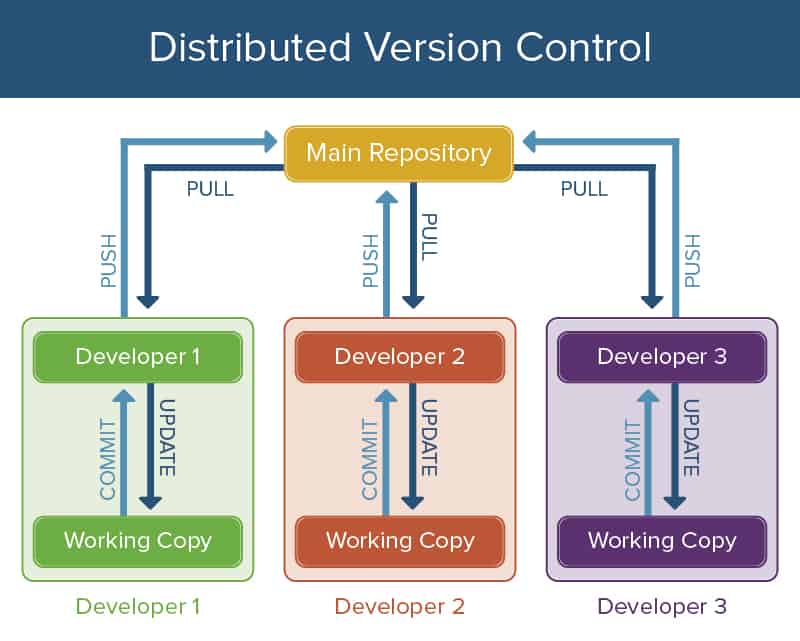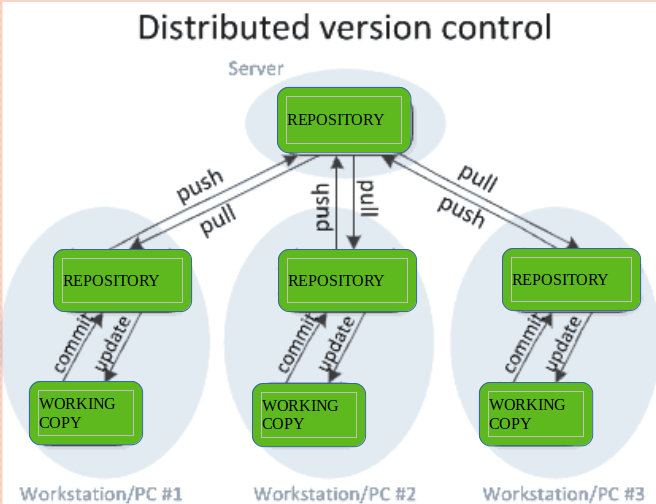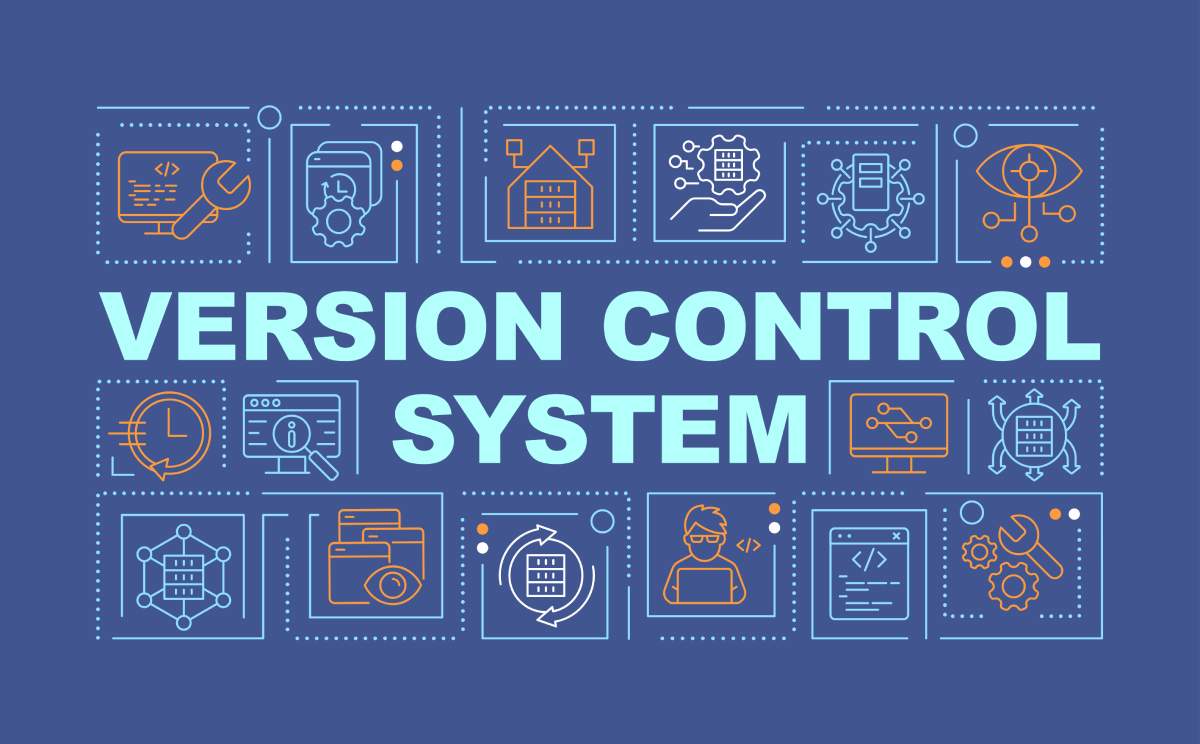A Comprehensive Guide To Version Control Systems (VCS) And Their Importance In Software Development
A Comprehensive Guide to Version Control Systems (VCS) and Their Importance in Software Development
Related Articles: A Comprehensive Guide to Version Control Systems (VCS) and Their Importance in Software Development
Introduction
With great pleasure, we will explore the intriguing topic related to A Comprehensive Guide to Version Control Systems (VCS) and Their Importance in Software Development. Let’s weave interesting information and offer fresh perspectives to the readers.
Table of Content
A Comprehensive Guide to Version Control Systems (VCS) and Their Importance in Software Development

In the dynamic world of software development, maintaining a clear and organized history of code changes is paramount. This is where Version Control Systems (VCS) come into play, providing a robust framework for managing codebases, tracking changes, and collaborating effectively. VCS tools have become indispensable for software development teams of all sizes, fostering efficiency, transparency, and collaboration.
Understanding Version Control Systems (VCS)
Version Control Systems (VCS) are software tools that allow developers to track changes made to code over time. They essentially create a chronological record of every modification, providing a mechanism to revert to previous versions, compare different iterations, and understand the evolution of a project.
Key Features of VCS:
- Centralized Repository: VCS tools store all code changes in a central repository, accessible to all team members. This ensures a single source of truth for the project.
- Branching and Merging: VCS enables the creation of branches, which are independent copies of the main codebase. Developers can work on new features or bug fixes in branches without affecting the main code. Once changes are complete, they can be merged back into the main branch.
- Revision History: VCS maintains a detailed history of all changes, including who made the changes, when they were made, and what was modified. This allows developers to trace the evolution of the code and understand the rationale behind specific decisions.
- Collaboration: VCS facilitates seamless collaboration among developers. Multiple developers can work on the same project simultaneously, with their changes being integrated automatically.
- Rollback and Recovery: In case of errors or unintended changes, VCS enables developers to revert to previous versions of the code, ensuring that the project remains stable and functional.
Types of Version Control Systems:
- Centralized Version Control Systems (CVCS): In CVCS, all code resides in a central server. Developers checkout the code from the server, make changes, and then commit their changes back to the server. Examples include Subversion (SVN) and CVS.
- Distributed Version Control Systems (DVCS): DVCS allows developers to have a complete copy of the repository on their local machines. Changes are made locally, and then pushed to a central repository or shared with other developers. Popular examples include Git, Mercurial, and Bazaar.
The Importance of Version Control Systems:
- Improved Collaboration: VCS enables developers to work together seamlessly on the same project, regardless of their location. Changes are tracked and integrated automatically, minimizing conflicts and ensuring that everyone is working on the same codebase.
- Enhanced Code Quality: VCS facilitates code reviews, allowing developers to scrutinize each other’s work, identify potential errors, and improve the overall quality of the code.
- Increased Productivity: By providing a robust framework for managing code changes, VCS helps developers focus on writing code, rather than worrying about managing files and versions. This leads to increased productivity and efficiency.
- Reduced Risk of Errors: VCS allows developers to revert to previous versions of the code in case of errors or unintended changes. This significantly reduces the risk of introducing bugs or breaking the application.
- Improved Traceability: VCS provides a detailed history of all code changes, making it easier to track down the source of bugs or understand the evolution of the project.
Choosing the Right Version Control System:
The choice of VCS depends on various factors, including the size of the team, the complexity of the project, and the desired level of control. For small projects, simple VCS like Subversion (SVN) may suffice. For larger and more complex projects, distributed VCS like Git are often preferred.
Benefits of Using a VCS:
- Reduced Development Time: VCS streamlines the development process by automating tasks such as version tracking, branching, and merging. This allows developers to focus on writing code, leading to faster development cycles.
- Improved Code Quality: VCS enables code reviews, which help identify potential errors and improve the overall quality of the code.
- Enhanced Collaboration: VCS facilitates seamless collaboration among developers, regardless of their location. This fosters a more efficient and productive development environment.
- Increased Stability: VCS allows developers to revert to previous versions of the code, minimizing the risk of introducing bugs or breaking the application.
- Improved Project Management: VCS provides a clear overview of the project’s progress, making it easier to manage tasks, track deadlines, and ensure that everyone is on the same page.
Tips for Using VCS Effectively:
- Regular Commits: Commit changes frequently to the repository. This creates a detailed history of the project and makes it easier to track down the source of errors.
- Descriptive Commit Messages: Write clear and concise commit messages that accurately describe the changes made. This helps other developers understand the purpose of the changes and makes it easier to navigate the commit history.
- Use Branches: Create branches for new features or bug fixes to avoid affecting the main codebase. This allows developers to work independently and integrate changes smoothly.
- Code Reviews: Conduct code reviews regularly to identify potential errors and improve the overall quality of the code.
- Back Up Your Repository: Regularly back up your repository to protect against data loss.
Conclusion:
Version Control Systems are an essential tool for software development teams of all sizes. They provide a robust framework for managing code changes, tracking progress, and collaborating effectively. By embracing VCS, development teams can improve code quality, increase productivity, and reduce the risk of errors, ultimately leading to more successful software projects.
FAQs:
Q: What are the different types of VCS?
A: The two main types of VCS are centralized and distributed. Centralized VCS (e.g., Subversion) store all code in a central server, while distributed VCS (e.g., Git) allow developers to have a complete copy of the repository on their local machines.
Q: How do I choose the right VCS for my project?
A: The choice of VCS depends on factors such as the size of the team, the complexity of the project, and the desired level of control. For small projects, simple VCS like Subversion (SVN) may suffice. For larger and more complex projects, distributed VCS like Git are often preferred.
Q: What are the benefits of using a VCS?
A: VCS offers numerous benefits, including improved collaboration, enhanced code quality, increased productivity, reduced risk of errors, and improved traceability.
Q: How do I use VCS effectively?
A: To use VCS effectively, commit changes frequently, write descriptive commit messages, use branches for new features or bug fixes, conduct code reviews regularly, and back up your repository.
Q: Are there any free VCS tools available?
A: Yes, there are many free and open-source VCS tools available, including Git, Mercurial, and Bazaar.
Q: What are some of the popular VCS tools?
A: Some of the most popular VCS tools include Git, Subversion (SVN), Mercurial, and Bazaar.
Q: How do I learn more about VCS?
A: There are many resources available online and in libraries that can help you learn more about VCS. You can also find tutorials and documentation on the websites of popular VCS tools.
Q: Is VCS necessary for all software development projects?
A: While not strictly necessary for all projects, VCS is highly recommended for any project involving multiple developers or complex codebases. It provides a robust framework for managing changes, collaborating effectively, and ensuring the stability of the project.
Q: Can I use VCS for projects other than software development?
A: Yes, VCS can be used to manage changes to any type of file, including documents, spreadsheets, and presentations. It is a versatile tool that can be used for a wide range of purposes.
Q: What are some of the challenges associated with using VCS?
A: Some of the challenges associated with using VCS include learning the tool, managing merge conflicts, and ensuring that everyone on the team is using the same version of the tool.
Q: What are some of the future trends in VCS?
A: Some of the future trends in VCS include cloud-based VCS platforms, improved integration with other development tools, and increased focus on security and compliance.
Conclusion:
Version Control Systems are an essential tool for software development teams, enabling them to manage code changes, track progress, and collaborate effectively. By embracing VCS, development teams can improve code quality, increase productivity, and reduce the risk of errors, ultimately leading to more successful software projects. The continued evolution of VCS tools and their growing integration with other development tools promise to further enhance the development process in the future.





![What is Version Control System (VCS) Examples List? [2023]](https://www.softwaretestingo.com/wp-content/uploads/2022/06/Version-Control-System-Software-List-Examples-1024x983.png)


Closure
Thus, we hope this article has provided valuable insights into A Comprehensive Guide to Version Control Systems (VCS) and Their Importance in Software Development. We appreciate your attention to our article. See you in our next article!